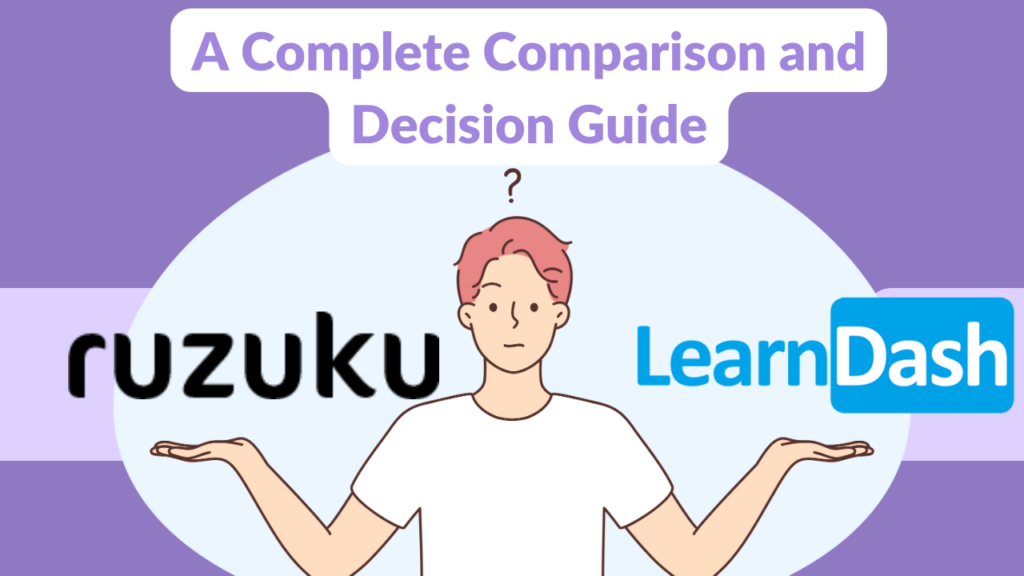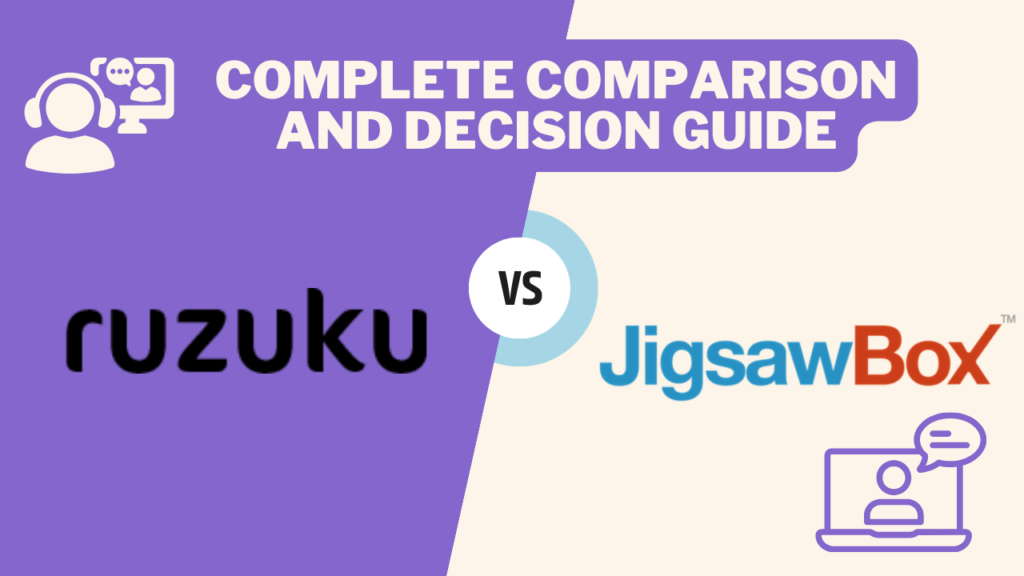
What’s in this Guide:
- Intro to LearnDash
- Intro to Ruzuku
- Feature breakdown
- Step-by-step decision guide
- Detailed visual checklist
Ruzuku and LearnDash are two options for coaches, authors, bloggers, speakers and other independent experts who are creating online courses.
LearnDash is a WordPress plugin designed to be installed on a website that you set up and manage. LearnDash was founded by Justin Ferriman and Kloe Ferriman. Learn more at learndash.com.
Ruzuku is a course and online community platform that is hosted for you at ruzuku.com. Ruzuku was designed by user experience consultants Rick Cecil and Abe Crystal, Ph.D., and launched in 2011.
Let’s take a look at the similarities and differences between the two platforms.
Last updated: December 20, 2017

Who is LearnDash for? Who uses it?
LearnDash is designed to build and sell online courses with WordPress. According to the LearnDash website, you can quickly create your course “in minutes and even sell your online courses.”
You can use LearnDash to protect specific pages of a WordPress website.
For example, you could post an article to your website and then “protect” it so that only people who have paid to join your course or membership program can access the article.
LearnDash is commonly used by educational institutions, non-profits, CEU training organizations and WordPress website developers.

Who is Ruzuku for? Who uses it?
Ruzuku is designed to support online courses or group programs in which many people go through a structured, step-by-step program together.
For example, a blogger who has written popular posts about using LinkedIn to find new career opportunities might create a 6-week course on “Using LinkedIn to Take Your Career to the Next Level.”
Here’s an example of an online course hosted on Ruzuku: 5 Steps to Your Online Course
Ruzuku is commonly used by experts and companies who offer courses in the areas of art & design, crafts, health & wellness, creative business, entrepreneurship, personal development, and professional skills, among many other areas.
Course platform capabilities
When considering any online course platform, you’ll want to examine several factors:
- Ease of setup and ease of use
- Registration and Payment
- Scheduling and Content Delivery
- Audio and Video: Hosting & Streaming Content
- Learning Community and Discussion Forum
- Progress Tracking
- Live Calls or Webinars with Recording
We’ll go over each of these areas in more detail.
Ease of Initial Setup & Use
A key factor in moving forward with your online course is ease of use — how easy it is to set up and manage your online program?
LearnDash emphasizes ease of use for people who are experienced with WordPress. Their website states that their focus is on, “WordPress LMS, made easy.”
To use LearnDash, you should be familiar with how to unzip, upload, and configure WordPress plugins.
In contrast, Ruzuku provides a hosted service, which is separate from your own WordPress site.
Ruzuku focuses on ease of use for initial course creation. You set up your first course by registering for a trial account on ruzuku.com, then clicking the “Create a new course” button.
Registration and Payment
Both Ruzuku and LearnDash enable you to set a price for your online program and charge for access.
Through an addon, LearnDash, supports Stripe, PayPal and 2Checkout integrations. It also allows for shopping cart plugins such as WooCommerce.
Ruzuku supports registering and payment people into a course. For example, a career coach might create a 6-week course for $499. The course would combine videos, worksheets, and group coaching calls. She might run this course several times throughout the year. The course platform would handle registration and payment for people signing up for sessions of this course.
Ruzuku can also be used with ongoing membership or continuity programs. You can charge participants a recurring monthly or annual fee.
Ruzuku allows you offer coupons (discount codes) for your participants, to offer special deals or to track partner purchases.
With Ruzuku, payment flows through a payment processor or shopping cart of your choice.
Ruzuku supports major payment processors and shopping carts:
- PayPal
- Stripe
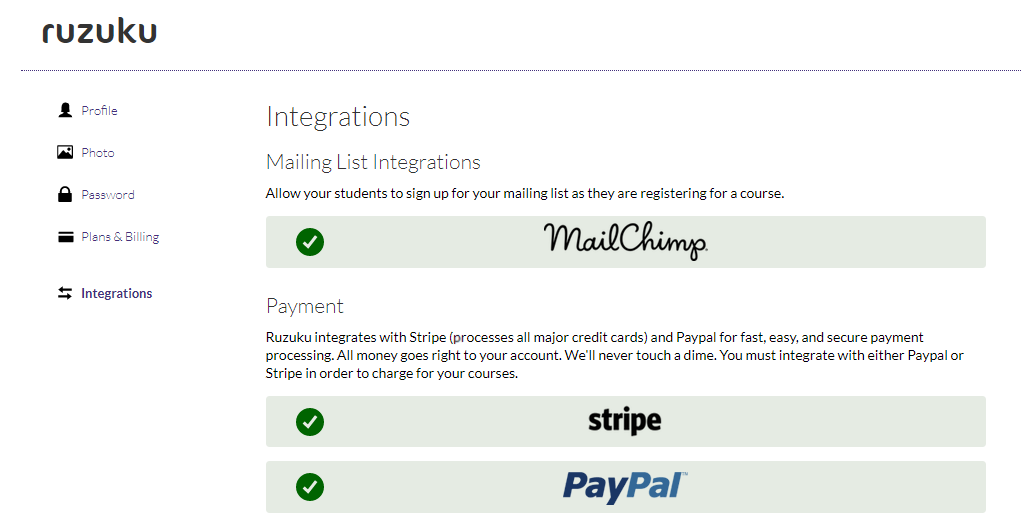
Scheduling and Content Delivery
LearnDash and Ruzuku are both designed to host either “scheduled” or evergreen courses.
A scheduled course starts on a specific date and allows a cohort of participants to go through the course together, on the same schedule. This model facilitates peer-to-peer learning and community for “live” courses and group coaching programs.
Ruzuku’s visual outline tool makes it straightforward to plan out your course, and choose the dates on which lessons are released.
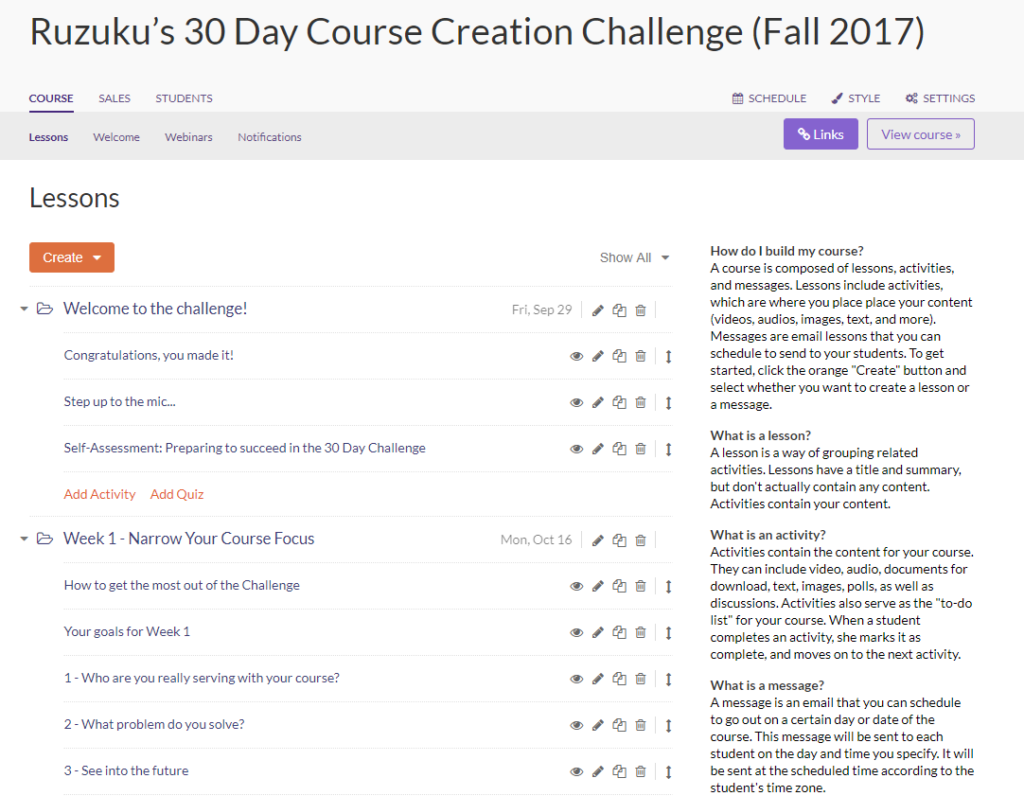
The same visual outline can also be used to structure evergreen courses, as well.
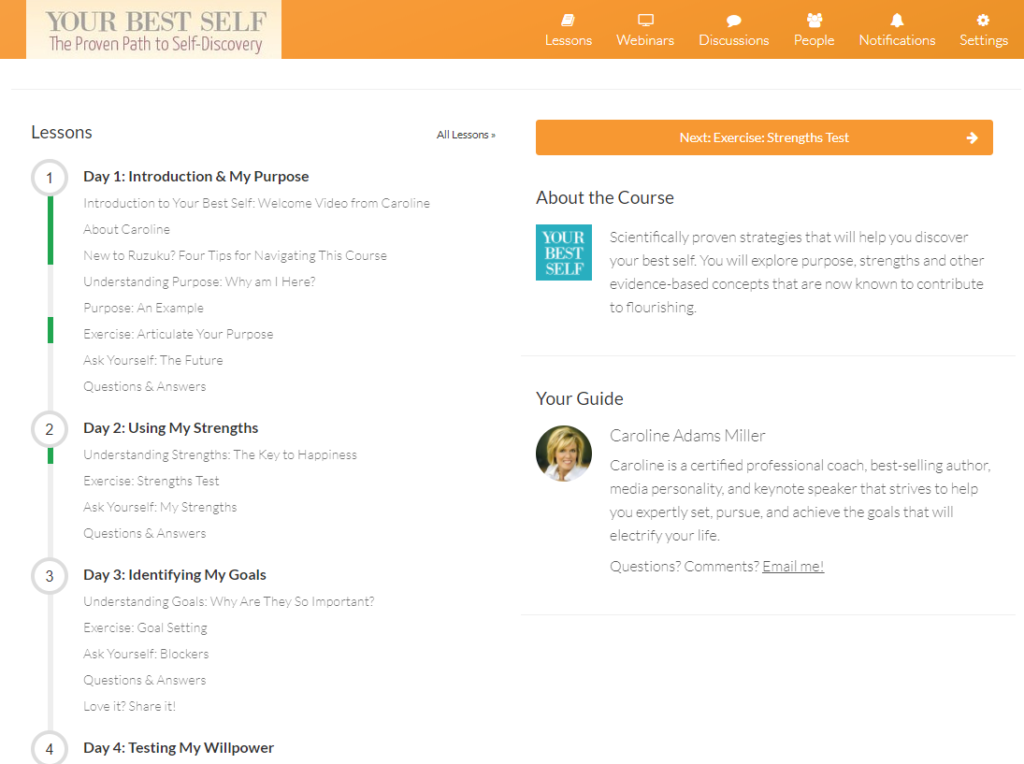
Audio and Video: Hosting & Streaming Content
As a WordPress plugin, LearnDash does not directly host any streaming media content. It is up to the course creator to identify the best way to host media such as audio/video files, and incorporate these media into LearnDash-protected pages.
Typically, creators would use a professional video hosting service such as Wistia (starts at $1,200/year) to host their media because using a public video service such as YouTube has important limitations for private courses. For example, YouTube may display ads in the videos, which can distract participants from the learning experience and hurt your brand.
Ruzuku includes professional audio and video hosting service as part of its course delivery platform, at no additional cost. You also have the option to embed videos from 3rd-party services.

All of Ruzuku’s plans include a global Content Delivery Network (CDN), to support students around the world.
Learning Community and Discussion Forum
As a WordPress plugin, LearnDash does not include native support for a learning community or discussion forum. It does offer an integration with BuddyPress, a WP forum plugin.
Ruzuku is designed around the importance of community and peer-to-peer support in online courses.
Participants have profiles with their name, a short biography, and a photo. As they participate in the course, a “learning journal” of all their work is automatically created:
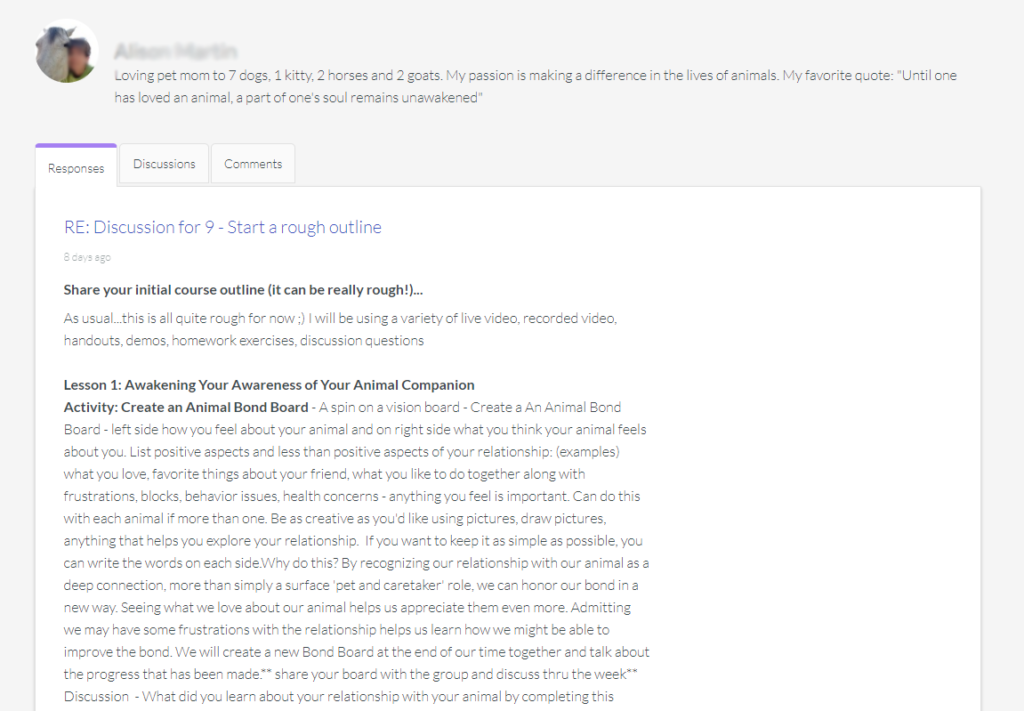
The Ruzuku online course platform provides integrated discussion forums for each lesson, as well as optional discussion prompts for specific activities. You can pose questions — and give students a space to reflect and share as they move through the course.
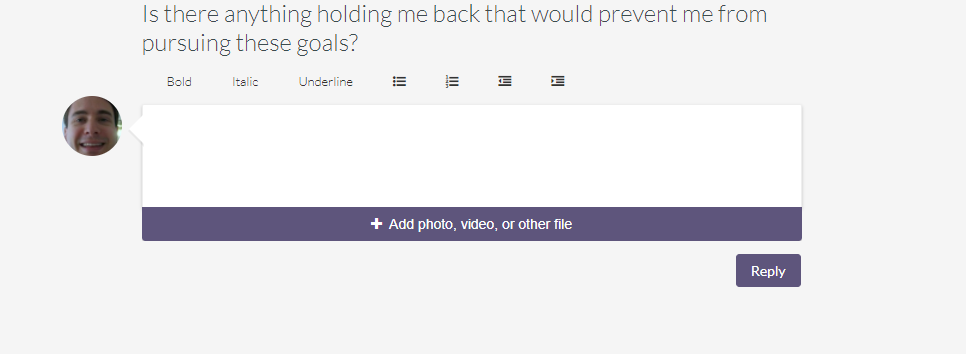
Participants can respond with both text comments, as well as documents, images, or even videos. For example, in an art course, a participant could upload a photo of one of her artworks to share with the community:
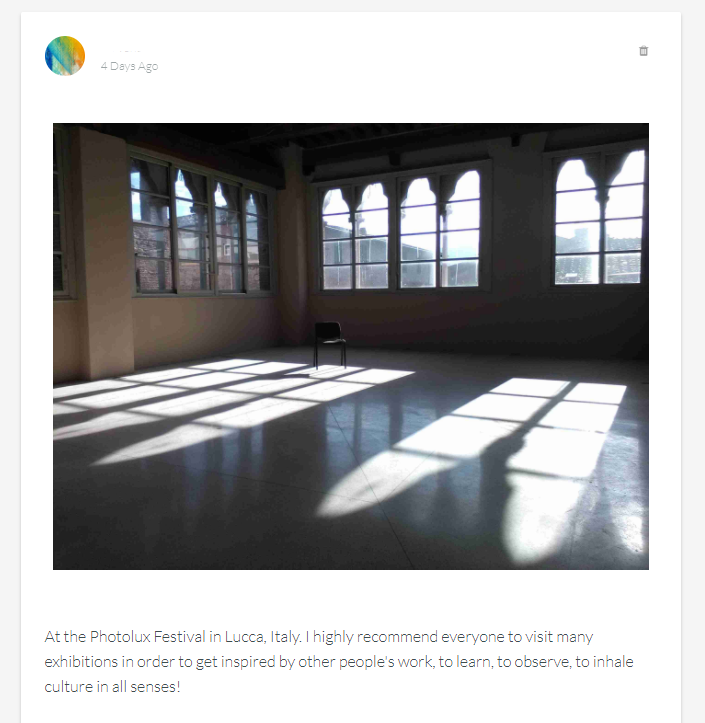
The “Notifications” stream makes it easy to see what others are posting and contributing in the course:
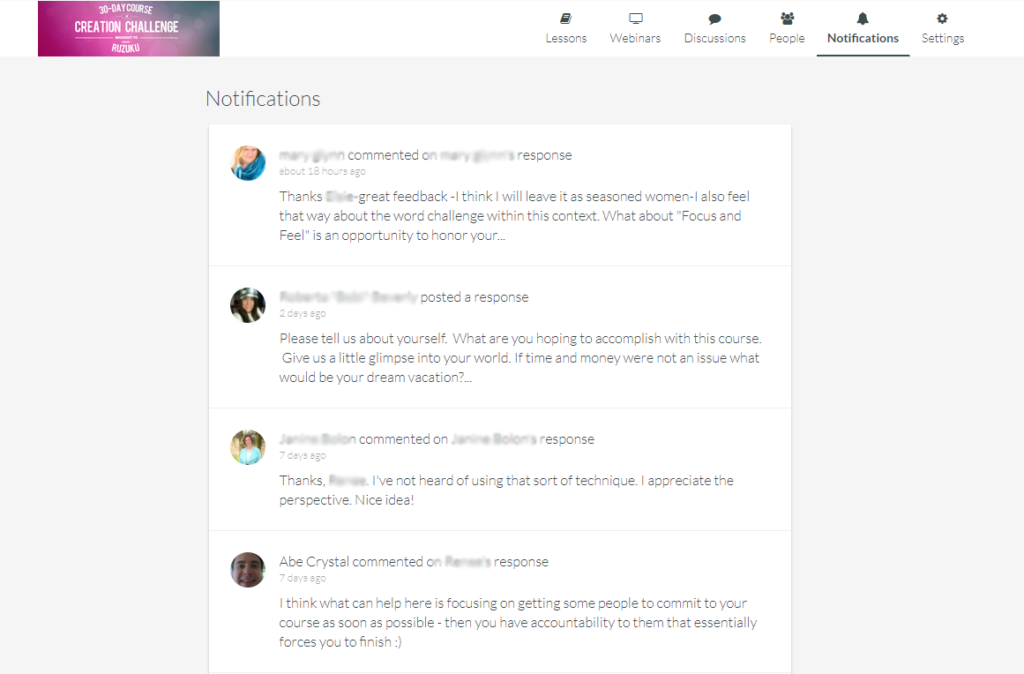
In addition, automatic email notifications keep participants engaged. For example, if Alice posts a comment and then Bob replies to her, Alice will receive an email notification.
Finally, Ruzuku can send daily and weekly emails to participants with summaries of the most recent posts and comments in the course. These emails help remind people to return and contribute to the course discussion, making for a more vibrant online discussion and community.
Progress Tracking
Ruzuku’s “Course Progress” feature gives instructors insight into how students are progressing and interacting in the course.
You can view analytics for the course as a whole, or drill down and view data for a specific step in your course. You can use information found in Course Progress to help determine who is staying on track, and who might need a little more encouragement.
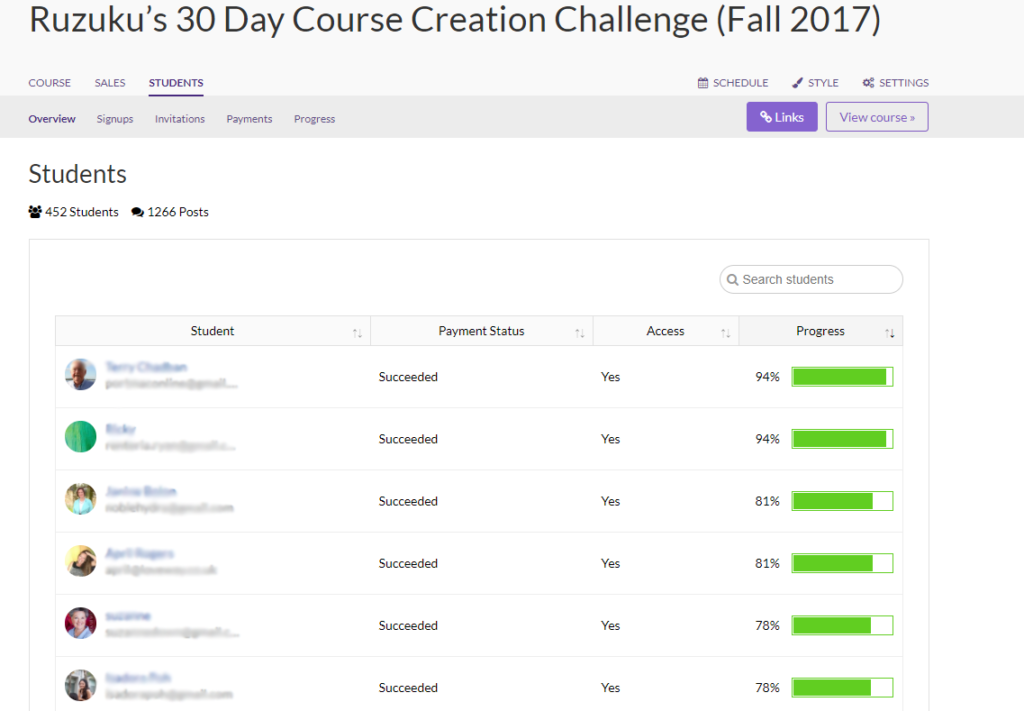
LearnDash also tracks student progress through the course. The course outline will display both the student’s overall progress through the course and which individuals’ lessons have been completed in the course.
Live Calls or Webinars with Recording
Live calls or webinars are a critical component for many online courses.
This is especially true with group coaching programs. The ability to meet in a “live” setting and share progress is what keeps your participants on track and motivated.
Ruzuku offers two forms of live events and interaction:
- teleconferences with slide presentations and group chat
- video webinars with slide presentations and group chat
You can easily create an event and run these live events directly through ruzuku without having to purchase or learn an external service:
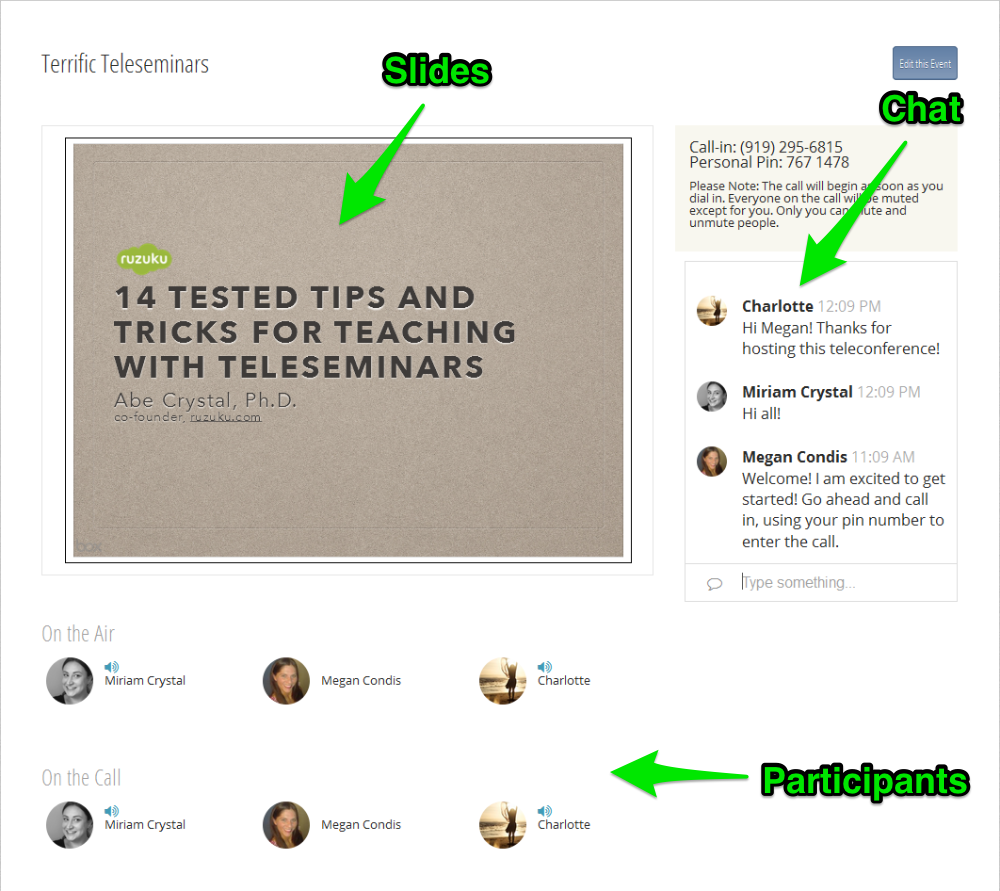
When someone includes a question mark with their comment, their chat will be highlighted automatically:
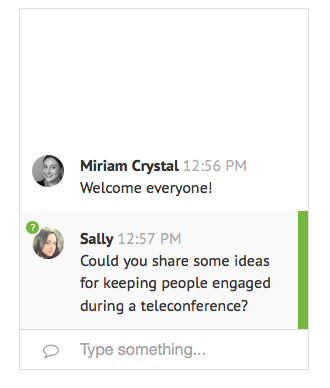
Teleconferences and webinars can be recorded automatically for later access.
LearnDash does not currently offer any conferencing or webinar features. You will need to use an external third-party program.
Pricing
LearnDash offers a three-tier pricing system based on the number of sites using the plugin. The smallest plan, covering one site, starts at $159 for the first year. Afterward, you may continue to use the plugin without renewing, but lose access to support and updates. For continued support and updates, you will need to renew your license each year. LearnDash offers customers renewing a 50% discount on their unexpired license. Complete LearnDash pricing can be found here: LearnDash Pricing »
Ruzuku’s plans start at $74/month (pre-paid annually). View Ruzuku’s pricing here: Ruzuku Pricing »
Both Ruzuku and LearnDash allow unlimited participants and courses with a paid subscription.
How to choose the right platform for you
Use our visual decision guide (below) to help you choose the right platform for your needs. Here are some considerations to take into account…
First, review what types of online courses/programs you plan to offer.
Are you intending to offer “live,” scheduled courses?
An example would be a 6-week course that starts on a specific date, with a group of people all going through the course together.
Do you also want to offer “On Demand” (self-study or “evergreen”) courses that are always available for registration?
Or do you want to create an ongoing membership or “continuity” site with recurring billing?
Ruzuku supports both models.
Next, review what types of live events and interaction you’d like to have within your programs.
Do you want to offer group conference calls or video webinars as part of a course?
Ruzuku integrates these types of live events directly into your courses. With LearnDash, you would research and purchase a separate conferencing and/or webinar system.
In addition, consider your technical skills and resources. Are you comfortable installing and configuring WordPress plugins (or do you have a team that can handle this technical implementation)?
These skills are important for making the most of LearnDash. In contrast, Ruzuku is designed to be used directly by the content expert or coach who is creating and teaching the program and doesn’t assume any specific technical skills.
Finally, test out each platform by participating in a sample program and creating a test program of your own.
Ruzuku provides free, sample courses you can join:
… as well as a 14-day free trial (no credit card required for sign up).
LearnDash offers you access to a free Demo hosted on their site. This Demo offer sample courses for you to enroll and use. However, to try your own content you have to purchase and download.
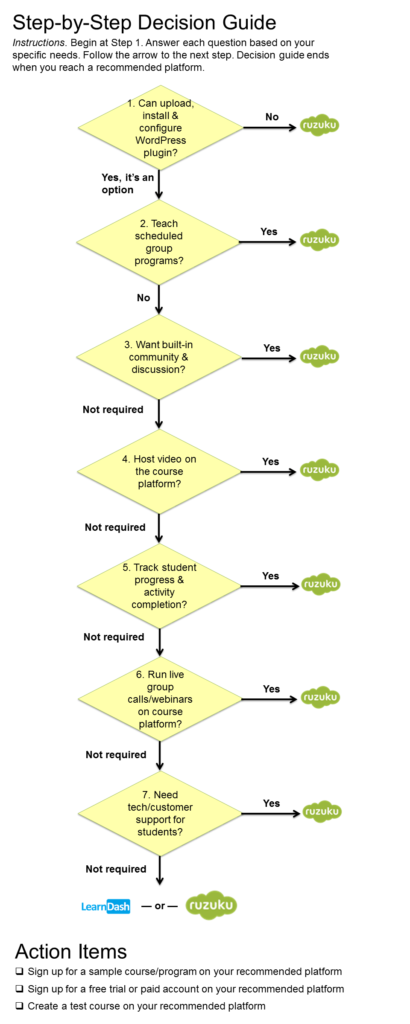
Your Next Step: Start a Free Trial
We hope this comparison guide has been helpful to you so far!
Now it’s your turn.
To sign up for your free, zero-risk trial (no credit card required), just click here.
Start your 14 day unlimited-use free trial of Ruzuku
Give Ruzuku a spin. And let us know what questions you have – we love to help!
| Category / Feature | LearnDash | Ruzuku |
| Platform category | Self-hosted WordPress plugin. | Managed (cloud) service, hosted on ruzuku.com. |
| Technical knowledge required | Upload, install and configure WordPress plugins. | No specific technical knowledge is assumed. |
| Registration & Payment | ||
| Charge for course access (single payment) |  |  |
| Charge for subscriptions to course access (recurring/continuous payments) |  |  |
| Create free ($0) courses |  |  |
| Invite or remove participants from courses |  |  |
| Coupon codes/discounts |  (with integrated shopping cart plugin) (with integrated shopping cart plugin) |  |
| Supported payment processors | Intergration with WooCommerce, Stipe and others | Direct integration: PayPal, Stripe.Other processors supported via link/redirect. |
| Supported email marketing providers | With free notification addon | MailChimp |
| Scheduling and Content Delivery | ||
| Live (scheduled calendar-based) courses with automatic email notifications |  |  |
| Copy a previous course and run it again on a new schedule |  |  |
| Self-study courses |  |  |
| Self-study courses with drip content |  |  |
| Audio and Video: Hosting & Streaming Content | ||
| Host and stream video | ✘ |  |
| Host and stream audio | ✘ |  |
| Global Content Delivery Network (CDN) for fast audio & video delivery | ✘ |  |
| Word documents |  (as a link/attachment) (as a link/attachment) |  (can be displayed directly in the web browser for students to view easily) (can be displayed directly in the web browser for students to view easily) |
| PDF documents |  (as a link/attachment) (as a link/attachment) |  (can be displayed directly in the web browser for students to view easily) (can be displayed directly in the web browser for students to view easily) |
| PowerPoint slides |  (as a link/attachment) (as a link/attachment) |  (can be displayed directly in the web browser for students to view easily) (can be displayed directly in the web browser for students to view easily) |
| Learning Community and Discussion Forum | ||
| Students have social profiles, bios, and photos in the course community |  |  |
| Discussion questions/prompts for specific activities/content | ✘ |  |
| Students can post images, PDFs, and videos in their responses | ✘ |  |
| General course-wide Q&A and forum |  (only with integration to a WP forum plugin like bbPress) (only with integration to a WP forum plugin like bbPress) |  |
| Receive email notifications when a student posts a question | ✘ |  |
| Send email announcements to all participants in course |  |  |
| Participants receive daily/weekly email updates to keep them engaged | ✘ |  |
| Progress Tracking | ||
| Students can mark each activity as complete, and track their own progress |  |  |
| Course Progress feature shows students’ activity completion and comment rates, with data for the whole course or by lesson | ✘ |  |
| Live Calls or Webinars with Recording | ||
| Host teleconferences with slides, group chat, and automatic recording | ✘ |  |
| Host video broadcasts with slides, group chat, and automatic recording | ✘ |  |
| Customer Service & Support | ||
| Instructor support (supporting you as you create and run your courses) | ||
| Phone/Skype | ✘ |  |
 |  | |
| Private Facebook group | ✘ |  |
| Searchable FAQ/knowledge base |  |  |
| “101” online training course | ✘ |  |
| Tutorial videos | ✘ |  |
| Student/participant support (supporting your participants as they register, pay, and access your courses) | ||
| Phone/Skype | ✘ |  |
| ✘ |  | |
| Searchable FAQ/knowledge base | ✘ |  |
| Tutorial videos | ✘ |  |
| Pricing | ||
| Free trial (no credit card required to sign up & try the platform) | Demo on plugin site | 14 days free |
| Initial setup fee | $156 | free |
| Ongoing hosting/support fee | $78 a year for continued access to support and updates | Starts at $74/month (pre-paid annually) |
Ready to try Ruzuku?
We hope this comparison guide was useful to you.
Now it’s your turn.
To sign up for your free, no-risk trial (no credit card required), just click here.
Start your 14 day unlimited-use free trial of Ruzuku
Give Ruzuku a spin. And let us know what questions you have – we love to help!

